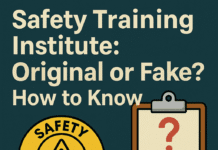
Certified Safety Professional Salary: A Comprehensive Guide
Introduction
Certified Safety Professional Salary : In today’s dynamic and safety-conscious work environment, the role of a Certified Safety Professional (CSP) is crucial in ensuring the well-being of employees and the overall success of an organization. A CSP is an individual who possesses the necessary expertise and credentials to evaluate, develop, and implement effective safety measures in various industries. This article delves into the factors influencing the salary of a CSP, the average salary range, and strategies to increase earning potential while maintaining job satisfaction.
Factors Influencing Certified Safety Professional Salary
- Education and Certification: A solid educational background and relevant certifications significantly impact a CSP’s earning potential. Advanced degrees, such as a Master’s in Occupational Health and Safety, can command higher salaries. Additionally, possessing industry-recognized certifications like the Certified Safety Professional (CSP) designation adds value to a professional’s profile.
- Industry and Work Experience: Salaries for CSPs can vary widely across industries. Those working in high-risk sectors like construction and oil and gas often earn more due to the demanding nature of their roles. Furthermore, extensive work experience in the field plays a vital role in determining salary levels.
- Geographic Location: The geographic location of the job is a key factor in salary determination. CSPs working in metropolitan areas or regions with high demand for safety expertise tend to earn higher salaries compared to those in rural or less populated areas.
- Job Role and Responsibilities: The specific job role and responsibilities assigned to a CSP also influence compensation. Senior-level positions or managerial roles tend to offer higher salaries than entry-level positions.
- Company Size and Reputation: The size and reputation of the employer impact salary packages. Established organizations with a strong commitment to safety are likely to offer competitive compensation to attract top talent.
Average Salary Range for Certified Safety Professionals
- National Average: As of the latest available data, the national average salary for a Certified Safety Professional in the United States falls within the range of $80,000 to $100,000 annually.
- Salary by Experience Level: Entry-level CSPs with minimal experience may start with salaries around $60,000, while seasoned professionals with several years of experience can earn upwards of $120,000 or more.
- Salary by Industry: CSPs working in high-risk industries, such as mining and aviation, often command higher salaries compared to those in lower-risk sectors like education.
- Salary by Location: Geographic location plays a significant role. For example, CSPs in California or New York usually earn higher salaries than those in less populated states.
Strategies to Increase Certified Safety Professional Salary
- Continuing Education and Certifications: Continuous learning and obtaining additional certifications showcase a commitment to professional development, leading to higher earning potential.
- Specialization and Niche Industries: Focusing on specific safety niches, such as hazardous waste management or process safety, can make a CSP more sought after and financially rewarded.
- Professional Networking and Membership: Active participation in professional organizations and networking events can open doors to lucrative job opportunities and salary advancements.
- Leadership and Management Skills: Developing strong leadership and management skills can lead to promotions and higher-paying managerial roles within the safety domain.
- Leveraging Technology and Innovation: Embracing technology and innovative safety practices can enhance efficiency and effectiveness, making CSPs valuable assets to organizations.
Job Satisfaction vs. Salary: Striking the Right Balance
- Finding Job Satisfaction Beyond Financial Rewards: Job satisfaction encompasses more than just salary. Factors such as meaningful work, positive work culture, and work-life balance contribute to overall job contentment.
- Prioritizing Work-Life Balance: Striving for a healthy work-life balance ensures that professionals can maintain productivity and perform optimally in their roles.
- Intrinsic Motivations for Career Growth: While a competitive salary is crucial, intrinsic motivations like personal growth, the impact of their work, and the sense of fulfillment are equally important for long-term career satisfaction.
Conclusion
A career as a Certified Safety Professional offers an exciting and rewarding opportunity to contribute significantly to workplace safety. The salary of a CSP can vary based on education, experience, industry, and location. By continuously improving their skills, leveraging opportunities, and seeking job satisfaction, CSPs can create a prosperous and fulfilling career path.
FAQs (Frequently Asked Questions)
- What is the primary role of a Certified Safety Professional (CSP)? A Certified Safety Professional is responsible for evaluating and implementing safety measures in various industries to ensure the well-being of employees and compliance with safety regulations.
- Does industry experience affect the salary of a CSP? Yes, industry experience plays a significant role in determining a CSP’s salary. Those with extensive experience in high-risk industries may command higher compensation.
- Are there opportunities for career growth in the field of safety? Yes, the field of safety offers ample opportunities for career growth, especially for CSPs who specialize in niche areas and showcase strong leadership and management skills.
- What are some essential certifications for a Certified Safety Professional? The Certified Safety Professional (CSP) designation is widely recognized and highly regarded. Additionally, certifications like the Occupational Health and Safety Technician (OHST) and Construction Health and Safety Technician (CHST) can add value to a professional’s profile.
- How can a CSP maintain job satisfaction in their career? Beyond financial rewards, CSPs can find job satisfaction by seeking meaningful work, maintaining a healthy work-life balance, and focusing on intrinsic motivations for career growth.
























